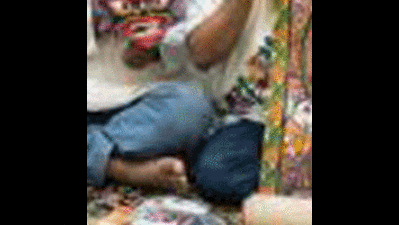- News
- City News
- kolkata News
- Bengal takes business to home of East India Company
Trending
This story is from May 5, 2016
Bengal takes business to home of East India Company
Two-fifty-nine years after East India Company brought business to Bengal, the roles have reversed with Brand Bengal, better known as Biswa Bangla now, travelling to the British Isles.

Two-fifty-nine years after East India Company brought business to Bengal, the roles have reversed with Brand Bengal, better known as Biswa Bangla now, travelling to the British Isles.
Kolkata: Two-fifty-nine years after East India Company brought business to Bengal, the roles have reversed with Brand Bengal, better known as Biswa Bangla now, travelling to the British Isles.
Starting Tuesday, shows are being organized in London, Edinburgh and Glasgow to hard-sell exotic crafts of Bengal. The exhibitions are a prologue to the grand Biswa Bangla showroom coming up in London three months later.
Titled 'Gods and Demons', the event includes live demonstration and workshops on the history of the masks of Bengal. There will be visual storytelling from Patachitra. Talking to TOI about UK's exposure to 'Bengal summer', MSME and textiles secretary Rajiva Sinha said, "The Biswa Bangla tagline 'where the world meets Bengal' says it all. The most exciting parts of the event are the live shows by artisans Suman Chitrakar and Sankar Das."
"Biswa Bangla believes there is a keen appreciation for Bengal arts and crafts in the modern global community and we want the British to be a part of it," said London-based designer Neishaa Gharat, who represents Biswa Bangla in the UK.
Chitrakar, a villager blended patachitra to modern-day products like bags, apparels and crockery, added, "Patuas moved from house to house, singing for grains and money. Gradually, this took the shape of the art form. In 2004, there were only 18 patuas in Naya, now there are 300."
John Bell, former chairmen of the British Guild of Travel Writers and a consultant for the United Nations World Tourism Organisation, delivered a key note at the Nehru Centre on Tuesday. "The more work we give to our friends (Das and Chitrakar) here, the more we are doing for the people of West Bengal and doing good for ourselves."
Euphoric over the brand's success, Biswa Bangla CEO Partha Kar gushed, "It is the country's first experiment of artisanal retail. There's nothing like this - of this scale, quality and aesthetics."
Starting Tuesday, shows are being organized in London, Edinburgh and Glasgow to hard-sell exotic crafts of Bengal. The exhibitions are a prologue to the grand Biswa Bangla showroom coming up in London three months later.
Titled 'Gods and Demons', the event includes live demonstration and workshops on the history of the masks of Bengal. There will be visual storytelling from Patachitra. Talking to TOI about UK's exposure to 'Bengal summer', MSME and textiles secretary Rajiva Sinha said, "The Biswa Bangla tagline 'where the world meets Bengal' says it all. The most exciting parts of the event are the live shows by artisans Suman Chitrakar and Sankar Das."
"Biswa Bangla believes there is a keen appreciation for Bengal arts and crafts in the modern global community and we want the British to be a part of it," said London-based designer Neishaa Gharat, who represents Biswa Bangla in the UK.
Das, who hails from South Dinajpur, will tell the British audience how "there was no rain in Kushmundi 200 years ago and people started praying to the gods for rain and restrict evil powers. Many characters became part of the dance - Kali, Rakshasa, Hanuman and Dakini."
Chitrakar, a villager blended patachitra to modern-day products like bags, apparels and crockery, added, "Patuas moved from house to house, singing for grains and money. Gradually, this took the shape of the art form. In 2004, there were only 18 patuas in Naya, now there are 300."
John Bell, former chairmen of the British Guild of Travel Writers and a consultant for the United Nations World Tourism Organisation, delivered a key note at the Nehru Centre on Tuesday. "The more work we give to our friends (Das and Chitrakar) here, the more we are doing for the people of West Bengal and doing good for ourselves."
Euphoric over the brand's success, Biswa Bangla CEO Partha Kar gushed, "It is the country's first experiment of artisanal retail. There's nothing like this - of this scale, quality and aesthetics."
End of Article
FOLLOW US ON SOCIAL MEDIA










